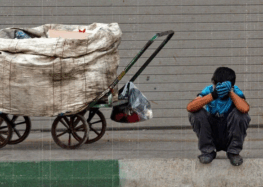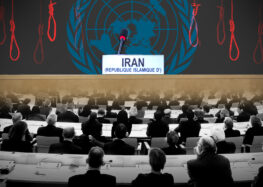Medical Care Intentionally Denied to Prisoners
No word on “disappeared” human rights defender Abdolreza Tajik since arrest on 12 June
 (7 July 2010) Iranian authorities are victimizing prisoners of conscience by subjecting them to dangerously unhealthy prison conditions and refusing them medical treatment when they become ill, the International Campaign for Human Rights in Iran reported today.
(7 July 2010) Iranian authorities are victimizing prisoners of conscience by subjecting them to dangerously unhealthy prison conditions and refusing them medical treatment when they become ill, the International Campaign for Human Rights in Iran reported today.
“Iran is targeting prisoners of conscience by subjecting them to overcrowding, disease, inadequate accommodations, insanitary conditions, malnutrition, and lack of access to medical care,” said Hadi Ghaemi, spokesperson for the Campaign.
Narges Mohammadi, Deputy Director of the Defenders of Human Rights Center, detained on 10 June 2010, was hospitalized following her recent release. During her detention, she developed severe fainting spells in prison under interrogation. Instead of providing her with proper medical care, her jailors subjected her to further lengthy interrogations.
Over a hundred post-election prisoners are held inside Ward 350 of Evin prison and are routinely denied access to proper medical care and subjected to exposure to filth, bad air, and low-quality food. A number of prisoners are suffering serious health problems that have been exacerbated by the unhealthy conditions in Ward 350 and other wards of Evin prison, including Zia Nabavi, Peyman Karimi Azad, Hamze Karami and Majid Tavakoli.
All of these conditions are in violation of Iran’s legal obligations as a signatory to the International Covenant on Civil and Political Rights (ICCPR).
As reported earlier by the Campaign , Evin prison’s Ward 350 is the most crowded ward in the prison, having seen a massive influx of political prisoners following post-election disturbances. The ward is known as the “Political Prisoner’s Ward,” as prisoners held for their political views are generally sent there following long periods of solitary confinement and interrogation. The Campaign has received and confirmed reports of spoiled and nutritionally poor food; filthy and germ-ridden bedding; and arbitrarily-restricted access to medical care.
The Campaign is also deeply concerned about the fate of Abdolreza Tajik, a journalist and member of the Defenders of Human Rights Center, who was arrested after Narges Mohammadi on 12 June 2010, and who has been “disappeared,” with no information being made available about his whereabouts.
Tajik’s sister has made repeated, unsuccessful inquiries to locate her brother, but told the Campaign, “It seems even the Prosecutor didn’t know why and by whom he was arrested and where he was kept.”
“Since even Judicial authorities claim no knowledge of Tajik’s situation, there is real cause for alarm about his case,” Ghaemi said.
The International Campaign for Human Rights in Iran called on Iranian prison authorities to comply with United Nations standards regarding prison conditions, and to cease using intentionally poor conditions as a means to pressurize and punish prisoners of conscience.
The Campaign also insists on the release of information about Abdolreza Tajik, including where he is detained, and on what legal basis.






